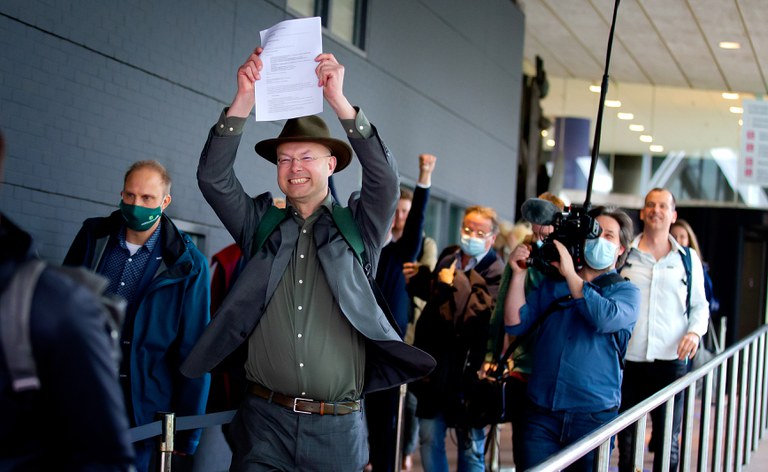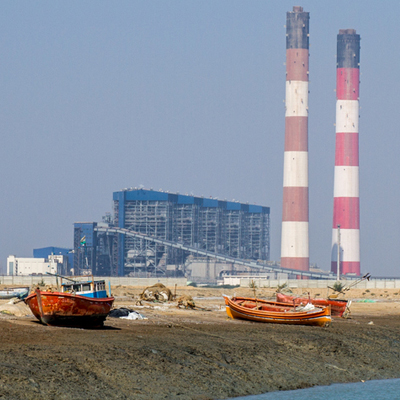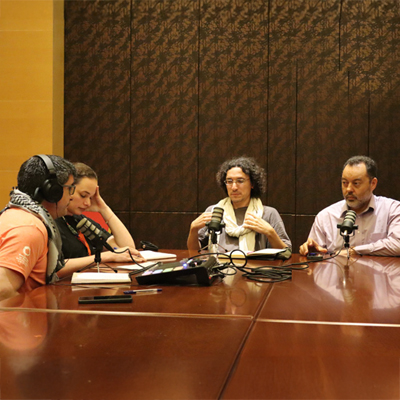Shell ordered to cut its CO2 emissions in half by 2030
After a lawsuit filed by Friends of the Earth, a court in The Hague ruled that the oil giant must reduce its emissions by 45 %
 Milieudefensie at the court in The Hague
Milieudefensie at the court in The Hague
“This is a historical moment for all of us. For the first time in history, a judge has ordered one of the largest polluters to stop contributing to dangerous climate change. The judge was crystal clear: Shell causes dangerous climate change, and Shell should stop immediately with doing that. It is a clear signal to all polluters in the world: you should get your act together! This is a major victory for the planet.”
This is what Donald Pols, director of Milieudefensie – Friends of the Earth Netherlands, said of the court’s landmark ruling on 26 May, which ordered Anglo-Dutch oil corporation Shell to reduce its carbon emissions by 45% by 2030 (compared to 2019 levels).
The parent company of the Shell Group (Royal Dutch Shell PLC) was taken to court in 2019, by Friends of the Earth together with six other organisations (ActionAid, Both ENDS, Fossielvrij NL, Greenpeace Netherlands, Young Friends of the Earth Netherlands and Waddenvereniging) and over 17,000 co-plaintiffs, who accused the corporation of being responsible for climate change due to its carbon emissions.
When the company was challenged, spokespeople at Shell said that it would comply with the climate targets in the Paris Agreement. However, the transnational corporation has continued emitting double the total greenhouse gas emissions of The Netherlands and continues drilling around the world in search of more oil and gas. Now, it must comply with this important ruling and develop a clear business policy to reduce emissions.
“This is a groundbreaking, historical verdict. We think that this will have a ripple effect in other jurisdictions and we expect a lot of similar climate cases around the world against the big polluters,” said Roger Cox, Milieudefensie’s lawyer. “This gives us also hope that the energy transition that needs to speed up, and needs to speed up quickly, can actually happen through these forceful measures, so we are happy that we are here.”
Sam Cossar-Gilbert, Coordinator of the Economic Justice-Resisting Neoliberalism programme at Friends of the Earth International considers that this is “a victory for everyone who is fighting for climate justice and for a safe future, particularly on what Shell has done -especially in the global South- and the incredible and horrific impacts that they have caused in the Niger Delta in terms of oil exploitation.”
“We think that it sets a really important legal precedent about accountability and responsibility further down the supply chain. Our hope is that the verdict will trigger a wave of climate litigation against big polluters, to force them to stop extracting and burning fossil fuels. We feel that the tide is turning and that oil and gas corporations must really take note or they’ll face legal actions themselves. As the lawyer of Friends of the Earth International said: ‘These big polluters must act now or face the court’,” added Cossar-Gilbert
In an interview with Real World Radio, Cossar Gilbert said that this verdict “can inspire people to get active and join a Friends of the Earth group or their local trade union, or a local climate action group or maybe a local agroecology project.” “We are all in the fight together for a system change and for a liveable future.”
He added: “We need to continue fighting against transnational companies and denounce the role that transnational companies are playing on the course of climate change. Only a hundred companies have been responsible for 75% of carbon emission over the last three decades. So our hope is that this case will back the litigations against big fossil fuel producers to stop their destructive ways.”
Shell must comply with the verdict right away. The Court established that the corporation’s current climate policy to meet Paris Agreement climate targets is not sufficiently clear or specific. The changes to their business policy must also cover not only Shell’s headquarters, but also its subsidiaries and suppliers around the world.
The corporation can appeal, but it will certainly face fines if it fails to comply with the ruling. As Friends of the Earth explained, “the court ruled that Shell must start reducing its CO2 emissions immediately. This means that Shell cannot simply wait for the outcome of an appeal. This is good news because 2030 is fast approaching. Therefore, any appeal process must not be allowed to have a delaying effect; Shell must begin by taking action NOW.”
“Shell is likely to announce it will appeal yet what we saw last time in a similar case in The Netherlands that was brought by Dutch citizens against the government, a very similar climate case, is that the government appealed and the climate ruling actually got strengthened. So we see that it is very likely based on this initial judgement that Shell will lose an appeal and it could even get strengthened in our favour, so it is quite a risk for Shell to appeal,” stressed Cossar-Gilbert. He shared that if Shell wants to comply with the target by 2030, it will have to start making business decisions today. “The order of the court is immediate, so there’s really no time to lose for Shell and also no time to lose for climate action.”
During the hearings in December 2020, the environmental organisation argued before the court that Shell is violating basic human rights, such as the right to life and a secure family life. “The court agreed with us. Because Shell is a major cause of catastrophic climate change, it puts people’s lives at risk. And this cannot be easily undone,” expressed Milieudefensie.
Milieudefensie also explained that, during the trial, Shell argued in court that it is primarily a task of the government to draft rules and regulations that must prevent further climate change. Shell expressed a willingness to comply with these regulations, but the court ruled that Shell must accept and assume its own responsibility.
Sam Cossar-Gilbert highlighted that the Court was able to issue a ruling like this thanks to years of mobilisations to demand climate justice and condemn Shell as one of the world’s biggest polluters. While these litigations against fossil fuel giants are important to stop the company’s destructive ways, “climate litigation is just one way: the movement is crucial to get climate justice.”
The Friends of the Earth International activist stressed that investment in public renewable energy is urgent, and that there are “countless scientific, technical, engineering studies that show that a clean, people-powered, 100% renewable energy future is possible.” He explained how lack of progress is not due to technical barriers.“What is lacking is the political will and the main thing standing in the way is the profit of the big energy companies and Big Oil. We need to stand up to them”, he concluded.






